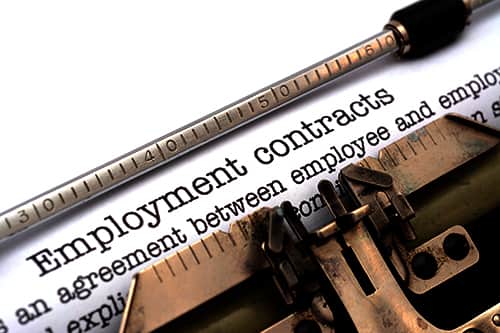Legal Updates to DIFC’s Employment Law
“Workers rights should be a central focus of development.”
-Joseph Stiglitz
 Introduction:
Introduction:
The Dubai International Financial Centre announced the the Employment Law Amendment Law No. 4 of 2021, which changes the Employment Law. The DIFC Authority's Board of Directors recently announced new Employment Regulations, which align the Qualifying Scheme regime with the DFSA's Employee Money Purchase Scheme, resulting in only a single layer of regulation for these schemes. The revisions to the Employment Legislation explain the applicability of limitation periods to claims brought under the law, the accrual of vacation leave, the duration of the probationary period for short-term fixed-term contracts, and the definition of specific terminology used in the law. The Amendment Law also alters the Employment Law's essential workplace health and safety criteria to accommodate working from home arrangements.
Key Changes:
- Limitation Period: The New Law maintains the six-month limitation period established by the Old Law, as well as the right of employees to file claims while they are employed. In respect to claims for improper deductions from, or non-payment of, payments owing to an employee, the New Law defines when the six-month limitation 'clock' starts. Except where the sums claimed are for maternity pay, paternity pay, pay for time off for ante-natal or adoption proceedings, sick pay, end-of-service gratuity, or contributions to any qualifying plan, the 'look back' period is certified to be two years.
- Probation Period: According to the New Law, for employees hired on a fixed-term contract for six months or less, the probation period can't be more than half of the contract term. For instance, if an employee is hired on a four-month contract, their probation time may be limited to two months.
- Annual leave: Employers and workers can agree on an amount of accrued annual leave to be carried forward under the New Law, as long as it is no fewer than five working days. The New Law further clarifies the Old Law's slightly unclear stance, confirming that the parties can agree on a larger carry-over sum. Following the Old Law's provision of statutory paternity leave, the New Law ensures that annual leave will continue to accumulate during paternity leave, whether for the New Law's five-day period or any longer time that the employer may provide.
- Different working models: The Old Legislation expressly allows a third-party employee to be seconded to a DIFC firm. The employee's employment can continue to be regulated by a law other than the Old Law. The New Law now extends to secondees some statutory responsibilities and rights, including confidentiality obligations, following an employer's orders, and protection from discrimination and harassment. Under the New Law, short-term employees (defined as employees who work for less than 30 days in 12 months) are now protected from discrimination and harassment. The New Law confirms employers' duties when workers work from home, with companies being compelled to:
- Equip the employees with information and training as well as safeguard their health and safety
- Notify workers in writing of any hazards associated with their jobs and the preventive measures they should take at the time of hire and comply with their general responsibilities to protect the health and safety of all employees, as far as is reasonably possible (including those working from home).
 Employers are not obligated to verify that any measures are in place at an employee's home in the event of a fire or the transit or use of hazardous products or chemicals.
Employers are not obligated to verify that any measures are in place at an employee's home in the event of a fire or the transit or use of hazardous products or chemicals.
- Qualifying Schemes:
Employers can use the default DIFC Employee Workplace Savings Plan (DEWS Plan) or an alternative plan (Qualifying Scheme) under the Qualifying Scheme savings regime, which went into effect in February 2020. However, following implementation, the DIFC Authority and the DFSA had difficulty evaluating applications from other eligible schemes run by foreign service providers.
A Qualifying Scheme, as well as its trustee and administrator, must be created in the DIFC and governed by the DFSA, save where:
- In another nation, the employer is required by law to make pension, retirement, savings, gratuity, or other similarly comparable payments to a system for those employees; or
- The value of such payments (not including any revenue or contribution made by the employer or the group to the costs of managing the plan) exceeds the essential benefits provided under the New Law. The employer is paying the payments to a group scheme on behalf of the employees.
 Employers in the DIFC who are currently using a savings scheme as an alternative to the DEWS Plan that does not meet the proposed new requirements will have a 12-month grace period to move to a different employee savings scheme going forward (from the date the new legislative requirements take effect).
Employers in the DIFC who are currently using a savings scheme as an alternative to the DEWS Plan that does not meet the proposed new requirements will have a 12-month grace period to move to a different employee savings scheme going forward (from the date the new legislative requirements take effect).
- Fee: Employers asking for a Certificate of Compliance or an Exemption Certificate now have to pay a charge of USD500.
- Deductions: Employees' capacity to make claims for improper deductions from their earnings have been regulated, and claims for overdue wages dating back two (2) years have been limited (subject to some exceptions).
Conclusion:
The changes to the Employment Law and Regulations reflect the Centre's ongoing commitment to maintaining a transparent and robust legal and regulatory environment in line with international best practices.
 Русский
Русский
 English
English 官话
官话 português
português عربي
عربي
 Türk
Türk 






.jpg)










